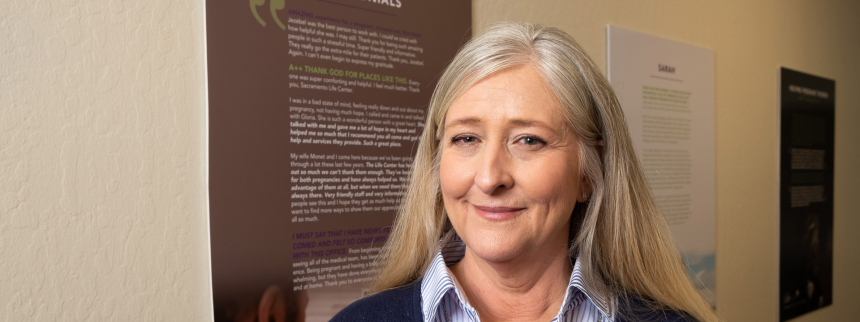
Joanne Hammett, patient advocate at the Sacramento Life Center, possesses a deep sense of concern for the person sitting opposite her in the counseling room: a woman facing a crisis pregnancy.
“They need to feel from us that we are caring and compassionate,” Joanne says of the patients, stressing “it’s not something you can ‘put on’” in some disingenuous attempt to persuade a specific outcome. Rather, authentic concern for these women and their unborn children must be sensed and known, otherwise “it’s over and they’ve shut down,” she portends.
“They cannot feel judged” about their difficult circumstances or possible leanings toward abortion, she adds. Judgement only serves to close the door on any hope of productive dialogue. “They can be defensive, they’re scared, they’re angry,” she pauses, speaking from the heart and with the unmistakable experience of 20 years in her role. “You just don’t know – it runs the gamut,” she explains. But she does know compassion eases heartache and instills hope.
Active listening comforts
“Active listening is the critical thing,” Joanne insists extending the sage advice of Life Center patient advocates to “anyone who might be in the position” to help an abortion-minded individual. Heartache may stem from distress, uncertainty, relationship issues, or economics, and she believes “letting that person say whatever it is that they need to say out loud, maybe for the very first time,” can help them find clarity.
“They may solve all their own problems without you ever having to say a word,” Joanne says, further endorsing the power of listening. “We don’t have to say a lot. We have to listen more.” Listening includes encouraging patients to “get it out,” in a non-threatening and supportive environment. “We’re reframing and repeating,” she says indicating a gentleness that allows patients to understand “we’re here to help them.”
Not every Life Center patient contemplates abortion. Joanne explains how the Life Center “casts a very broad net” and “helps a lot of people” including women who are very happy to be pregnant but may not have insurance, or who need a pregnancy verification for MediCal. Still, many come in confused, without support and unaware of resources. They believe abortion is their only option.
“Just talking it out can really help them solve their problems,” Joanne reports. Many decide to continue their pregnancy and return for an ultrasound appointment, finding themselves at that critical turning point when heartache becomes hope.
Right time and place
“When patients come to us at the Life Center we have the perfect situation,” Joanne explains, referring to significant clinical and educational resources. Patients seek them out “expecting to receive advice from professionals.” Without these assets, the everyday person faces big hurdles in offering guidance to someone experiencing a crisis pregnancy.
“It’s a completely different dynamic,” Joanne cautions, emphasizing how “they have to discern if the Lord is asking them to speak.” If the answer is yes, if a person feels he or she is “the messenger,” then listening, understanding, compassion and love must be employed.
“Slogans are not helpful,” Joanne offers candidly, pointing to prominent pro-life and pro-choice debates. Impromptu person-to-person conversations can crumble quickly, sliding back to catchphrases and sayings. She implies there is a time and place for public advocacy but it can seldom be justified in a moment of crisis. A referral to trained professionals offers the better option.
Prepare with prayer
When approaching these delicate situations, Joanne responds, “Prayer is always the first thing for me.” A member of St. Mel Parish in Fair Oaks, she takes time to pray in silence before every meeting.
“I just ask to be a calming influence on the person,” Joanne says, keenly aware of her patients’ all-consuming fear. She hopes “to help relieve that fear because decisions made in fear are not going to be good decisions.”
“How I love God is in service to my neighbor,” Joanne imparts, clarifying that “neighbor” is the patient, a co-worker, a server at a restaurant, or her own child. “How am I to serve in this moment?” she asks with a quick reply. “Listen for the answer. Hope for the courage and strength to do what He asks me to do.
“I have to be full of all that the church offers – prayers, sacraments and Scripture,” she shares with joy knowing “I’m not depleted and I can give from that abundance.”
Always compassion, always hope
Joanne concedes, some women do choose abortion. “It’s never a happy experience,” she regrets, although compassion is in great supply at the Life Center. They offer post-abortion counseling and an open door for those struggling years and even decades later.
For patients who carry their babies, after the immediate need has been met, the Life Center offers continuing education, parenting classes, reading materials, nurse access and continued advocacy as patients become established with medical providers.
“He is in there with us,” Joanne says affirming her faith in God’s goodness and her love of neighbors in crisis. If conversations seem unsuccessful, “when they leave, He goes with them,” she is sure. She knows “He doesn’t abandon them – a lot of times he brings them back!”
“Hope in the Lord doesn’t disappoint,” Joanne says, emanating an aura of compassion wrapped in calm – the vital link between heartache and hope.
LEARN MORE
About the Sacramento Life Center at www.saclife.org. The Life Center receives funds from generous donations to the Annual Catholic Appeal, a program of The Catholic Foundation.

